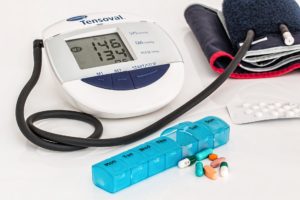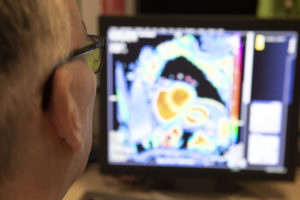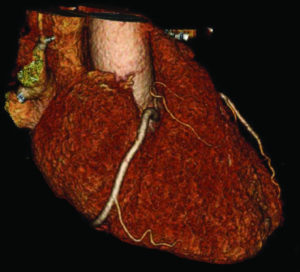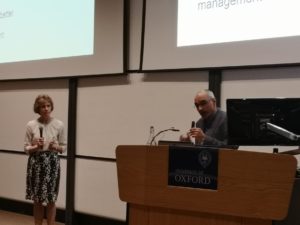The NIHR Oxford BRC has announced the appointment of its latest group of Senior Research Fellows – the third cohort of emerging research leaders to receive the accolade. Like in 2020, this year’s selection process was a coordinated effort by the Oxford BRC and its partners in the NIHR ... READ MORE
News for Cardiovascular Medicine
AI detects life-threatening blood vessel inflammation from COVID-19 variants
New artificial intelligence (AI) technology to scan for heightened blood vessel inflammation can calculate a person’s risk of death from COVID-19 and COVID-19 variants. The technology could be used to tailor their treatment and give them the best chance of recovery, according to new research ... READ MORE
Having a healthier heart associated with better problem-solving and reaction time
People with healthier heart structure and function appear to have better cognitive abilities, including increased capacity to solve logic problems and faster reaction times, according to a study involving University of Oxford and Queen Mary University of London (QMUL) researchers. The study, ... READ MORE
Foods linked to greater risk of cardiovascular disease and death in middle-age identified
Two common dietary patterns identified in British adults may be associated with an increased risk of cardiovascular disease and death in middle-age, according to a study by Oxford University researchers. The research, which was supported by the NIHR Oxford Biomedical Research Centre, was ... READ MORE
More people could benefit from blood pressure-lowering medication, study finds
Blood pressure-lowering medication can prevent serious cardiovascular conditions such as strokes, heart failure and heart attacks, even in adults with normal blood pressure, according to a new research by University of Oxford researchers In a paper published in the Lancet, the researchers found ... READ MORE
NIHR Advance Fellowship awarded
Dr. Chris Miller, University of Manchester, was awarded an NIHR Advanced fellowship for £1.3m. This is an important milestone towards creation of the UK HFpEF registry, which will become the key platform for collaborative UK clinical and translational HFpEF research. ... READ MORE
Seven in ten patients hospitalised with COVID-19 not fully recovered five months after discharge
A majority of survivors who left hospital following COVID-19 had not fully recovered five months after discharge and continued to experience negative impacts on their physical and mental health, as well as their ability to work, according to results released by a major national study into the ... READ MORE
Genetic breakthrough to target care for deadly heart condition
University of Oxford researchers have discovered a new type of genetic change in the DNA of people with the inherited heart condition hypertrophic cardiomyopathy, the leading cause of sudden cardiac death in young people. The findings, in a paper published in Nature Genetics, could transform ... READ MORE
Eight BRC projects get RCF funding
Eight Oxford BRC proposals, many covering a number of themes, have been awarded NIHR Research Capability Funding (RCF) funding to take forward key areas of research. The selected projects that will be supported include: Developing a research centre devoted to urgent and acute careThe ... READ MORE
Common heart medication does not increase risk of COVID-19 hospitalisation
A study by Oxford researchers, supported by the NIHR Oxford Biomedical Research Centre (BRC), found that ACE inhibitors and ARBs – both common treatments for high blood pressure and heart failure – are not generally linked to an increased risk of severe COVID-19 disease or an increased likelihood of ... READ MORE
Thousands miss out on life-saving heart attack treatment due to COVID-19 pandemic
Researchers at the University of Oxford have published new research that shows that by the end of May there had been about 5,000 fewer hospital admissions with heart attack in 2020 than would be expected, suggesting that many patients have missed out on lifesaving treatment. The research showed ... READ MORE
Link between high cholesterol and aortic valve disease risk found
Oxford researchers have found that while having high cholesterol levels does not influence a person’s risk of aortic or mitral regurgitation, it does increase their risk of developing another major heart valve disease - aortic stenosis. Aortic stenosis is the most common form of heart valve ... READ MORE
Oxford haematologists win national awards to further their research
Two consultant haematologists at the Oxford Haemophilia and Thrombosis Centre (OHTC), based at the Churchill Hospital, have been awarded funding for their research as part of a new national scheme. Dr Nicola Curry and Dr Susie Shapiro were among the recipients of the new Clinical Academic ... READ MORE
AI identifies ‘fingerprint’ that predicts heart attack risk
Oxford researchers have developed a new biomarker – derived through artificial intelligence analysis of routine CT scans – that can identify people at high risk of a fatal heart attack at least five years before it strikes. The researchers, who are supported by the NIHR Oxford Biomedical Research ... READ MORE
Heart failure care must address patients’ broader health if survival rates are to improve
Oxford BRC-supported researchers have provided new evidence that might explain why the prognosis of heart failure patients has improved so little over the past decade. Findings show that a decline in cardiovascular deaths has been offset by an increase in the number of deaths from infections and ... READ MORE
New approach to reducing damage after a heart attack
During the emergency procedure used to reopen the blocked artery that has caused a heart attack, smaller ‘micro’ blood vessels can remain constricted, causing significant damage, according to a new study. The research by Associate Professor Neil Herring of the University of Oxford’s Department of ... READ MORE
Research suggests high blood pressure is major cause of heart valve disease
New research has conclusively found that long-term exposure to high blood pressure increases the risk of heart valve disease, with significant implications for clinical practice guidelines and health management. “Clinical practice guidelines currently make little reference to preventative ... READ MORE
Women and older people most likely to experience shortcomings in heart failure care
A study of 93,000 UK adults with heart failure has revealed critical care shortcomings in diagnostic tests, drug prescriptions, and follow-up patterns, with women and those over 75 years of age disproportionately affected. The study by The George Institute for Global Health at the University of ... READ MORE
Oxford researchers spot tell-tale signs of potentially fatal cardiac condition
Researchers in Oxford have employed a technique more commonly used in brain imaging to identify the tell-tale signs of the potentially fatal heart condition hypertrophic cardiomyopathy, the leading cause of sudden cardiac death in young people. This Oxford BRC-supported study is the first time ... READ MORE
Event showcases BRC work tackling chronic diseases
Around 170 people attended a BRC event on Tuesday (26 March) that provided an opportunity to network and to hear about the breadth of research taking place in Oxford to combat chronic diseases such as diabetes, obesity, cardiovascular disease and dementia. The Chronic Disease Cluster, ... READ MORE














